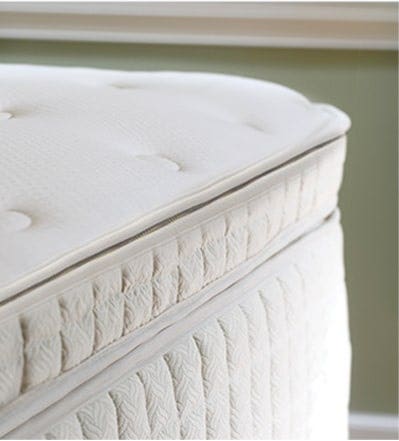As the new year approaches, many of us are thinking about resolutions to improve our lives. New Year's resolutions sometimes get a bad rap because it's all too easy to quit the gym or fall off the diet regimen by mid-February. However, using the holiday as a time to reflect and reset is time well spent.
That's why we're recommending that you make 2024 your year of better sleep. While many resolutions focus on diet or exercise, an often overlooked aspect of health is sleep quality. That changes today!
What Is Restorative Sleep?
Restorative sleep refers to the phase of sleep where the body repairs itself. It is during this deep sleep stage that the body rebuilds tissues, strengthens the immune system, and processes memories and emotions. Achieving restorative sleep consistently leads to improved concentration, enhanced mood and better health overall.
On the other hand, a lack of restorative sleep can lead to chronic health issues, including:
- Weakened immunity
- Mood swings
- Weight gain
- Decreased cognitive function
Understanding the significance of quality, restorative sleep is the first step towards improving your sleep – the cornerstone of your overall well-being.
Poor Sleep Hygiene Isn't Helping You
Sleep hygiene refers to the practices and habits that are conducive to sleeping well on a regular basis. Poor sleep hygiene – like irregular sleep schedules, an uncomfortable sleep environment or the use of electronics before bed – can severely impede your ability to achieve restorative sleep. Addressing these factors is the first step in improving your sleep quality.
Restorative Sleep Resolutions for 2024


To help you embark on a journey towards better sleep, here are 10 sleep hygiene resolutions for 2024:
1. Establish a Consistent Sleep Schedule
Consistency is key in building a healthy sleep-wake cycle. Setting a fixed time for going to bed and waking up helps regulate your body's internal clock, making it easier to fall asleep and wake up naturally. Even on weekends and holidays, try to stick to your schedule as closely as possible.
2. Develop a Relaxing Bedtime Routine
A calming pre-sleep routine signals to your body that it's time to wind down. This might include activities like reading, gentle stretching or listening to soothing music. Avoid stimulating activities such as intense exercise or engaging with electronic devices.
3. Optimize Your Bedroom Environment
A conducive sleep environment is quiet, dark and cool – between 60 and 67° F, ideally. Invest in good quality bedding, use blackout curtains to eliminate light and set the thermostat to that cool and comfortable level. Reducing noise and light pollution can significantly enhance the quality of your sleep.
4. Get the Right Support
Your mattress and pillows play a crucial role in your sleep comfort. Choose a mattress that supports your body type and sleeping position and pillows that maintain the alignment of your neck and spine.
5. Limit Blue Light Exposure Before Bed
Blue light from screens can disrupt your sleep cycle by suppressing melatonin production. Minimize the use of electronic devices an hour before bed. Consider using blue light filters or glasses if screen use is unavoidable.


6. Mind Your Diet
What you eat affects your sleep. Avoid heavy or large meals, caffeine and alcohol before bed. These can disrupt your sleep cycle or cause discomfort, preventing you from entering deep sleep stages.
7. Incorporate Regular Physical Activity
Regular exercise has been shown to improve sleep quality. However, try to finish any vigorous workouts a few hours before bedtime, as they can leave you too energized to fall asleep.
8. Practice Stress-reducing Techniques
High stress levels can wreak havoc on your sleep. Incorporate stress-reducing practices like meditation, yoga or deep breathing into your daily routine to promote relaxation and better sleep.
9. Keep a Sleep Diary
Tracking your sleep patterns can help identify habits or activities that harm your sleep quality. Note down the times you go to bed and wake up, how long it takes to fall asleep, and any night-time awakenings.


New Year, New Mattress
Consider switching to a certified organic mattress and kick harsh chemicals out of your bedroom. Among other benefits, organic materials can improve indoor air quality and reduce allergens, contributing to a more restful sleep – and more peace of mind in the new year, too.
Naturepedic can help! Our collection of certified organic mattresses and more offers safer, healthier, better sleep for the whole family – Baby, Kids, Adult and even Pets.
Remember, good sleep quality is as vital as a balanced diet and regular exercise for your overall health. By adopting these changes, you're not just improving your sleep – you're enhancing your quality of life.
Here’s to a year of peaceful nights and rejuvenating sleep. Happy New Year from Naturepedic!
 BABY
BABY  KIDS
KIDS  ADULT
ADULT  LEARN
LEARN  STORES
STORES 





